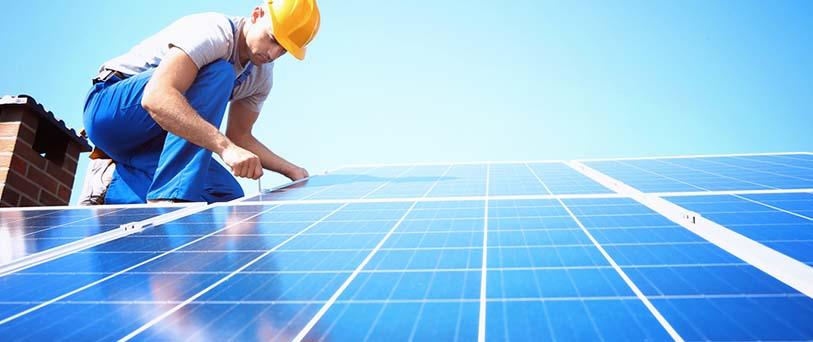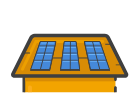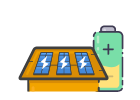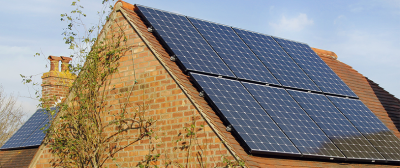Solar Panel Efficiency

The majority of solar panels on domestic systems in the UK are around 10-20% efficient although some types of solar panels can reach an efficiency level of up to 25%.
Here we've compared the best solar panel manufacturers on the market to which offers the highest efficiency. Solar cell efficiency will have a direct impact on how much sunlight is converted into electricity by your panels and therefore how much you could save on energy bills. Additionally, solar batteries can be a good option to store excess energy and use it during peak hours, but be wary of solar battery prices as they can impact your overall savings.
What does solar panel efficiency mean?
Solar panel efficiency ratings tell you how effective a solar panel is at converting sunlight into electricity. It is represented by a percentage and most solar panels for residential installations are between 15-20% efficient.
Whilst this might sound like a low figure, a 4 kW solar panel system could generate enough electricity to dramatically reduce your energy bills and carbon emissions. The kW rating on solar panels is the power output. Solar power outputs represent how much electricity the panels are capable of providing for your home.
Find out: how much electricity does a 4kw solar system produce?
Solar panel efficiency calculation
Solar panel efficiency is calculated by scientists in controlled laboratory conditions. The Standard Test Conditions (STC) for solar panel efficiency are to see how much solar energy the cells can convert to electricity on a sunny day of 25°C with an irradiance of 1000 W/m2.
However, the weather is rarely consistent and certainly not always sunny in the UK. While solar panels will still generate electricity on a cloudy day, the efficiency level will decrease. The maximum efficiency level is not necessarily what the panels will achieve in real-world conditions. For this reason many solar panels now have a PTC rating which tells you how they perform in a variety of climates. There may also be a system PTC rating which represents how efficiently the inverter converts solar energy into electricity.
Solar panel efficiency by type
There are 3 types of solar panel cell and the type you choose will determine how efficient they are and how much electricity they will generate.
- Monocrystalline solar panels are the most efficient type of solar panels as the cells are constructed from just one single piece of silicon. This is also the more expensive type of solar panel.
- Polycrystalline solar panels are made up of multiple silicon crystals which means there are spaces between them and not as much silicon to convert solar energy. This makes them slightly less efficient than monocrystalline but they are often larger (and cheaper) to compensate.
- Thin-film solar cells are thin layers of silicon on top of electrical components. They are less efficient than monocrystalline or polycrystalline but are cheaper, lighter and more flexible.
The most efficient solar panels
In this solar panel efficiency comparison table we've highlighted the solar panels with the highest efficiencies being manufactured for UK homes.
| Manufacturer | Highest Efficiency Available* |
|---|---|
| LG | 21.4% |
| Panasonic | 19.7% |
| Canadian Solar | 19.89% |
| Solarcentury & IKEA | 16.82% |
| Sharp | 20% |
| SolarWorld | 17.89% |
| Yingli Solar | 19.1% |
*Excluding bifacial solar panels
Compare these solar panels in more detail in our review of the best solar panels.
The best way to ensure your solar PV system is as efficient as possible is to have an MCS certified (or equivalent) and experienced solar installer assess your needs, which you can find using Solar Guide.
Solar panel efficiency over time
Solar panel efficiency does decrease over time due to the natural degradation of the solar cells (about 0.5% each year). The majority of solar panel manufacturers will include a performance guarantee of 20-25 years which guarantees the panels will still be working to approximately 85% of the panel's original capacity for that period.
What else reduces solar panel efficiency?
There are a few other factors affecting the efficiency of a solar panel installation. Most of these should be considered before you have the system installed and a reputable solar installer will be able to advise you on the best options for your home.
Shading
Just a small amount of shade on a solar panel can have a big impact, in fact some reports suggest as little as just 10% of the panel being in shade can reduce its efficiency by up to 50%. Before installing solar panels on your home, the installer should carry out a shading analysis to evaluate any potential issues from obstructions like chimneys or trees.
Panel placement
In the UK it is recommended that solar panels are installed on south facing roofs for optimum efficiency. Whilst they can be placed on some East and West facing roofs, the output levels are a lot lower. Additionally, it matters whether the solar pannels are placed on the roof or whether they are integrated solar panels, which are usually around 5-10% less efficient. Another issue is whether you have the proper planning permission to place solar panels, which can be an issue in flats and apartments.
Roof pitch
The pitch, or angle of your roof can affect the number of hours of sunlight your panels receive in a day. For this reason it's important to consider the pitch of your roof before installation. The best pitch for domestic solar arrays in the UK is around 30-45 degrees.
Maintenance
Whilst regular rainfall can clean solar panels, occasionally they may need cleaning more thoroughly to remove any bird droppings or dirt that could be reducing efficiency. The easiest way to go about this is hiring a professional as they will have the experience and equipment to carry out the cleaning safely.
Temperature
Solar panels are designed to collect energy from the sun, but they can actually see a reduction in efficiency when they get too hot. This generally shouldn't be a problem in the UK as we rarely see high enough temperatures to cause any issues.
What are bifacial solar panels?
Conventional solar panels have PV cells on one side, the side facing out from the roof, bifacial solar panels on the other hand, boast PV cells on the front and back. Installing bifacial solar panels on top of a reflective surface maximises energy generation, with some manufacturers claiming that they can produce up to 30% more energy.
Why compare quotes for efficient solar panels?
By comparing several quotes and types of panels you can find the most efficient ones at the best price. Not only that, but you can secure the best deal for the solar system size you need. For instance, by comparing multiple quotes you can find different 5kW solar system prices and find the lowest one in no time.
Solar panels offer some great long-term benefits for UK homeowners including:
Cheaper energy bills
The reason most homeowners turn to solar energy is to reduce their ever increasing energy bills. Your own solar panel system would be generating free electricity from the renewable energy of the sun rather than buying it from a supplier.
Free electricity all year round
Solar panels can still generate electricity even on cloudy days, allowing you to get the most out of your solar panels all year round.
Smaller carbon footprint
Solar energy is renewable (it won't run out in a human timescale) and, unlike most electricity from the grid, doesn't require the burning of fossil fuels which means you're contributing less carbon to the atmosphere.
Less reliance on your energy supplier
Free, renewable energy generation with solar panels lessens your reliance on your energy supplier which, as we mentioned, will reduce your energy bills.
Get the most efficient solar panels installed
If lower energy bills all year round has convinced you to install a solar panel system on the roof of your home then the next step is deciding which solar panels you'd like installed. Once you've decided, you'll need to find a fully-qualified solar installer to carry out the installation and that's where we can help.
Complete one of our simple online forms and you'll be contacted by up to 4 MCS certified (or equivalent) solar companies in your local area who will each provide a quote. Comparing multiple quotes gives you the greatest chance of finding the best deal possible for the solar panel installation, as you can compare and pick the one that's right for you.
Find local, MSC certified Solar Installers
Start your quote
Find local, MSC certified Solar Installers















